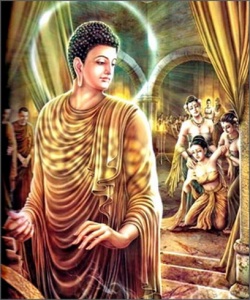Four teachings of method
four teachings of method
化儀の四教 (Jpn kegi-no-shikyo )
A classification by T'ient'ai (538-597) of Shakyamuni Buddha's teachings according to how they were expounded. Together with the Four teachings of doctrine, it forms the system of classification known as the Eight teachings. The four teachings of method are:
(1) The sudden teaching, in which The Buddha preached directly from the standpoint of his own Enlightenment, independently of his listeners' capacity, and without giving them preparatory Knowledge. This category corresponds to the Flower Garland Sutra.
(2) The gradual teaching, which The Buddha expounded progressively to gradually elevate his disciples' capacity to understand higher teachings. This category includes the teachings of the Agama, Correct and Equal, and Wisdom periods.
(3) The secret teaching (more precisely, the secret indeterminate teaching), in which The Buddha preaches in such a way that his listeners understand according to their individual capacities and thereby each receive different benefits without being aware of the differences.
(4) The indeterminate (or non-fixed) teaching (more precisely, the explicit indeterminate teaching), in which The Buddha's listeners understand his teaching differently and thereby receive different benefits in the same way as above, but are aware of the differences. This teaching is called indeterminate because the benefits that the listeners receive are not fixed but vary with their respective capacities.
